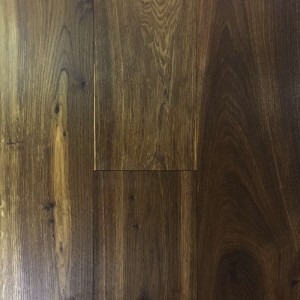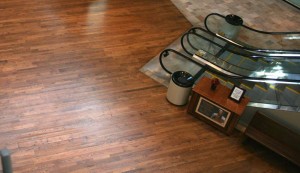Deciding to get hardwood floors for your home is easy. If you’ve got the time and the money, hardwood flooring can be classic, modern, funky, artsy, mosaic, shiny, matte and just about any color you can imagine. The hard part is deciding what type of hardwood floor you want, and what type of wood you want to use. Hardwood floors last a lifetime, so you want to do some research and look for inspiration before you install your new floors.

Table of Contents
ToggleThe subfloor will play a factor in the type of wood you choose
Besides design, color, and installation pattern of your hardwood floors there are a few other factors you need to consider. You may have seen gorgeous hardwood floors in one home, but they would end up being completely wrong for your home.
Before you go and order your solid or engineered wood, find out what type of subfloor you are working with. Whether it’s concrete or plywood or other will determine what type of wood will work the best. If you insist on solid wood flooring, but your subfloor is concrete, you may need to redo your subflooring as well.
Typically only engineered wood is suitable to be installed on a cement subfloor, but if you don’t want to pay for the additional installation and labor cost of placing plywood over your cement subfloor so that you can install your solid wood planks, a skilled hardwood flooring professional should be able to accommodate a solid wood floor installation on a cement subfloor.
The location of your floors will play a factor in the type of wood you choose
Where in the house your hardwood floors are going to be installed is another factor to consider. Mainly, if your floors are going into a room that is below ground level, the additional moisture in a “below ground” space can cause damage to solid wood flooring. Engineered wood handles moisture a lot better, and is the preferred choice for below ground, or below grade, spaces.

Photo: Oak Floors by T&G Flooring, Flatiron Crossing Mall, Broomfield, Colorado
For hardwood floors that are “on grade” (ground level) or “above grade” (above ground) can handle either solid or engineered wood.
The downsides are that you need completely flat boards (hard to come by in longer lengths), and the glue is so strong that there’s a permanency to it. “If you have a leak or a flood, getting the material up is incredibly difficult,” Hagen says. “You’ll also want to check the VOCs [volatile organic compounds, which are toxic] in the product. And we ask clients about any chemical sensitivities.”
Your lifestyle will play a factor in the type of wood you choose
Now that you’ve figured out the physical limitations to your hardwood choices, it’s time to think about your lifestyle and how much fun and activity your floors are going to be seeing. Kids, pets, and parties should all play a part in choosing the type of wood you use for your floors.
A skilled hardwood flooring craftsman will be able to accommodate most, if not all, of your requirements so that you get the hardwood floor of your dreams. Stop by our showrooms to get inspiration for your next hardwood flooring project.

